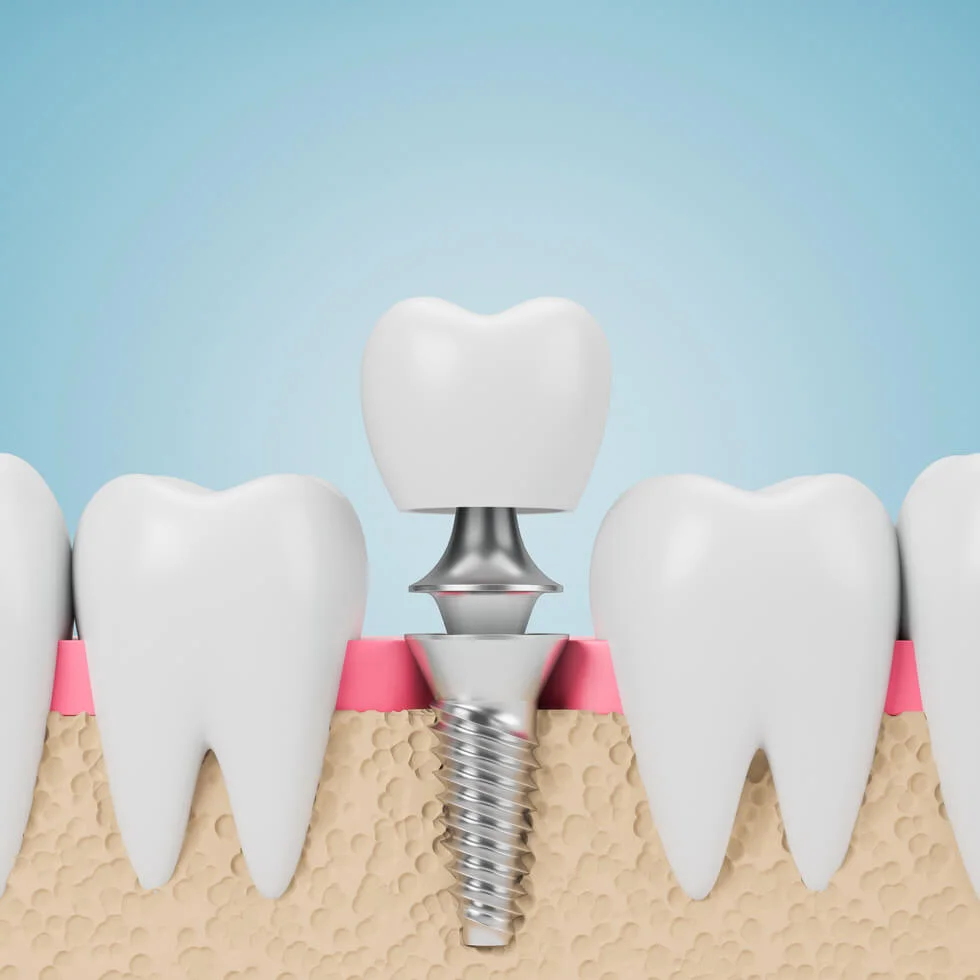
The Basics of Dental Implants
A Journey to a Lasting Smile
Dental implants are a revolutionary solution for replacing missing teeth, offering a natural-looking and durable alternative to traditional options. Here’s a step-by-step guide to understanding how dental implants work:
1. Consultation and Planning:
Before diving into the implant process, a thorough examination and consultation with your dentist are crucial. This involves assessing your oral health, bone structure, and discussing your specific needs and expectations.
2. Implant Placement:
The actual implantation is a surgical procedure where a titanium implant is securely placed into the jawbone. Titanium is chosen for its biocompatibility, allowing the implant to fuse with the bone in a process called osseointegration.
3. Osseointegration:
Over the next few months, the jawbone and the titanium implant bond, creating a stable foundation for the artificial tooth. This process is essential for the long-term success of the implant and ensures it mimics the strength of a natural tooth root.
4. Abutment Placement:
Once osseointegration is complete, an abutment is attached to the implant. The abutment serves as a connector between the implant and the final restoration, usually a crown. This part is visible above the gum line.
5. Crown Placement:
The final step involves placing a custom-made crown onto the abutment. This crown is designed to match the color, shape, and size of your natural teeth, resulting in a seamless and aesthetically pleasing smile.
Advantages of Dental Implants
Why Choose Implants Over Other Options?
1. Natural Look and Feel:
Dental implants closely mimic the appearance and function of natural teeth. They look and feel like your own, providing a confident and comfortable smile.
2. Longevity:
With proper care, dental implants can last a lifetime, making them a durable and cost-effective solution for tooth replacement.
3. Jawbone Preservation:
Unlike other options, implants stimulate the jawbone, preventing bone loss that often occurs with missing teeth. This helps maintain facial structure and overall oral health.
4. Improved Chewing and Speech:
Implants restore full chewing function, allowing you to enjoy your favorite foods without restrictions. They also enhance speech, addressing any challenges caused by missing teeth.
Is Everyone a Candidate for Dental Implants?
Factors Influencing Candidacy
While dental implants offer numerous benefits, not everyone is an immediate candidate. Factors such as overall health, oral hygiene, and the condition of the jawbone play a crucial role. Your dentist will assess these factors during the initial consultation to determine if dental implants are the right option for you.
Demystifying the Cost of Dental Implants: What to Expect
How Much Do Dental Implants Cost?
1. Number of Implants:
The total cost is significantly influenced by the number of implants needed. Whether you’re replacing a single tooth or multiple teeth, each implant contributes to the overall expense.
2. Material Used:
The material of both the implant and the crown affects the cost. Titanium implants are a popular choice for their durability and biocompatibility, while materials like zirconia may have a different price point.
3. Additional Procedures:
If you require preparatory procedures such as bone grafting or sinus lifts to ensure a strong foundation for the implants, these will contribute to the overall cost.
4. Location and Dentist Expertise:
The geographical location of the dental practice and the expertise of the dentist also play a role. Practices in urban areas or with highly experienced professionals may have higher fees.
5. Type of Restoration:
The type of restoration placed on the implant, such as a crown, bridge, or denture, influences the cost. Each restoration has its own associated expenses.
6. Insurance Coverage:
Dental insurance coverage varies, and not all plans cover the full cost of implants. Check with your insurance provider to understand what is covered and what you’ll need to pay out of pocket.
Average Cost Ranges
Setting Realistic Expectations
While costs can vary widely, it’s helpful to have a general idea of the average price range for dental implants:
Single Tooth Implant: $3,000 to $4,500
Implant-Supported Bridge: $4,000 to $15,000
Full Mouth Restoration: $15,000 to $30,000 or more
These figures are rough estimates, and actual costs may differ based on the factors mentioned earlier.
Investing in Long-Term Oral Health
Beyond Numbers: Recognizing the Value
While the initial cost of dental implants may seem significant, it’s essential to view it as an investment in your long-term oral health and overall well-being. Dental implants offer benefits such as durability, a natural appearance, and the prevention of bone loss, making them a valuable and lasting solution for tooth replacement.
Exploring Financing Options
Making Quality Care Accessible
Many dental practices offer financing options to help make the cost of dental implants more manageable. Discuss payment plans, financing, and potential discounts with your dentist to find a solution that aligns with your budget.



